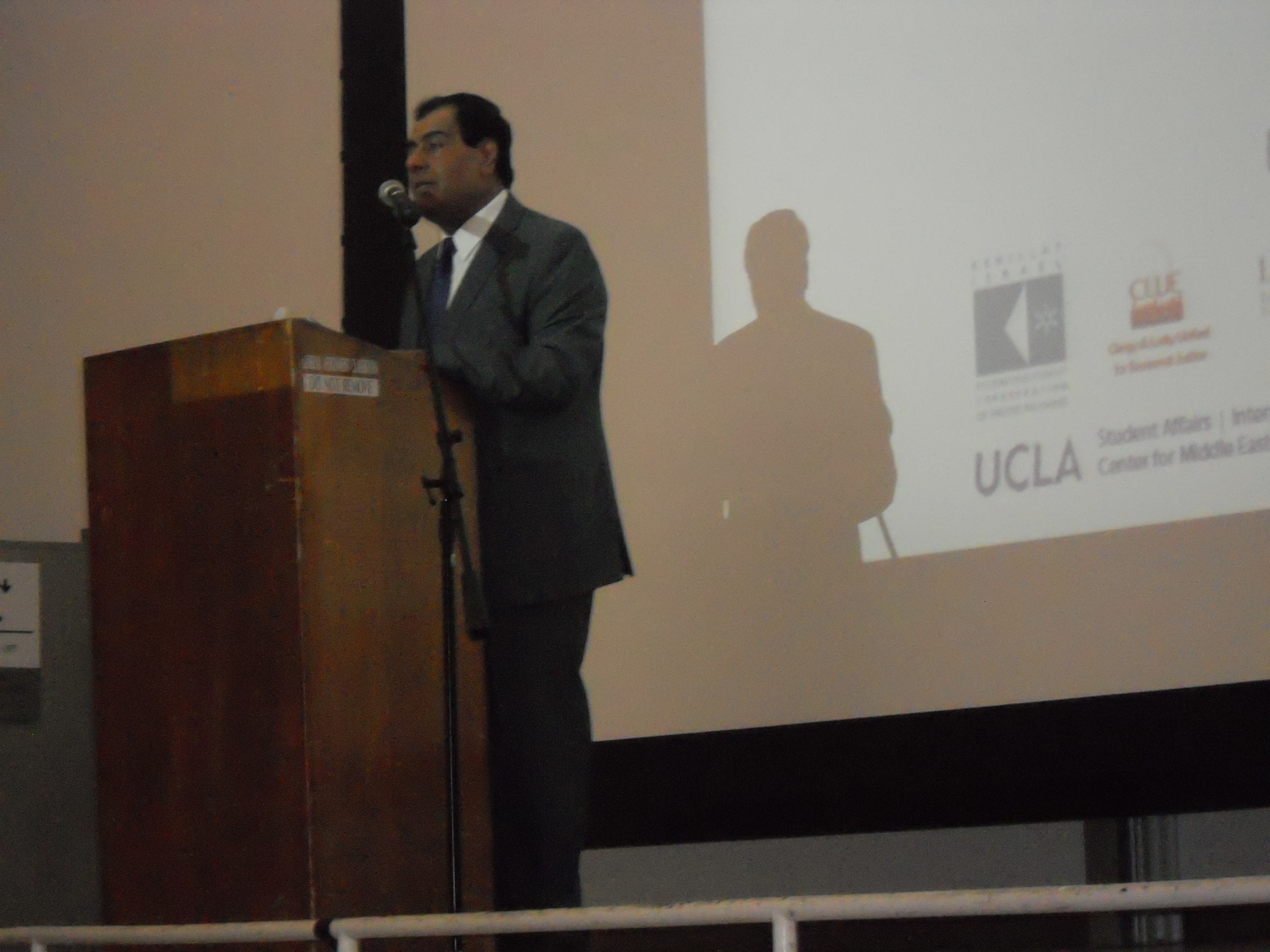 As a part of Kehillat Israel’s (a Reconstructionist Congregation in Los Angeles) “Week of Civil Discourse,” put on by the Younes and Soraya Nazarian Center for Israel Studies at UCLA, Dr. Izzeldin Abuelaish was invited to speak in Broad Hall on April 18. The large variety of co-sponsors of the event, including the Olive Tree Initiative, the Burkle Center for International Relations, and Hillel at UCLA, reflected the great interest in the event. This was further evident in the ethnic and religious diversity of students, faculty, and guests who attended.
As a part of Kehillat Israel’s (a Reconstructionist Congregation in Los Angeles) “Week of Civil Discourse,” put on by the Younes and Soraya Nazarian Center for Israel Studies at UCLA, Dr. Izzeldin Abuelaish was invited to speak in Broad Hall on April 18. The large variety of co-sponsors of the event, including the Olive Tree Initiative, the Burkle Center for International Relations, and Hillel at UCLA, reflected the great interest in the event. This was further evident in the ethnic and religious diversity of students, faculty, and guests who attended.
Dr. Abuelaish’s wide appeal reflects his desires to breach man-made ethnic and religious cleavages, and to focus on the commonalities of humanity. Also known as the “Gaza Doctor,” Abuelaish was born in the Jabalia refugee camp in Gaza, where he was forced to fight through deprivation and suffering in order to survive. Despite these circumstances, or perhaps because of the strength he developed to overcome them, Abuelaish succeeded in becoming the first Palestinian doctor to work in an Israeli hospital.
UCLA Chancellor Gene Block gave the opening remarks, emphasizing the need for civil discourse and constructive dialogue in light of the Boston bombings. Block encouraged students to enroll in the Fiat Lux seminar he leads, “Diversity and Leadership,” which promotes conflict resolution. Following the Chancellor was Professor Arieh Saposnik, who introduced the speaker as a man capable of transforming tragedy, which is so prevalent in the Middle East, into something constructive.
Dr. Abuelaish’s speech interwove his personal tragedies with messages of strength, encouragement, and hope for the future. He began with the struggle of his mother, and all Palestinian mothers, to encourage education as a pathway to understanding. According to the Palestinian Women’s Research and Documentation Center and a 2003 report by the United Nations Educational, Scientific, and Cultural Organization, education continues to be a form of protest against regional upheaval, as it is necessary for a democratic society and economic improvement. The report cites that women in Palestine are some of the most educated women in the Middle East and North Africa. Palestinian 15-19 year old women have a 97.5% literacy rate, and young men lag behind by a mere 0.9%.
 Female empowerment was a key part of his message of peace; he firmly believes that peace naturally emerges from a world of justice and hope. He went on to say that no one can be ignorant and free, and it is vital that women be given equal opportunity to be educated and to succeed. The level of development in a country, argued Abuelaish, can be measured by the education of women.
Female empowerment was a key part of his message of peace; he firmly believes that peace naturally emerges from a world of justice and hope. He went on to say that no one can be ignorant and free, and it is vital that women be given equal opportunity to be educated and to succeed. The level of development in a country, argued Abuelaish, can be measured by the education of women.
Abuelaish placed great value on the role of women in society: “We are all indebted to our mothers,” because mothers make the greatest sacrifices for their children. He asserted that orphans who lose their mothers, rather than their fathers, lose “the one who gives the whole heart.” One must note, though, that however progressive his ideas towards female empowerment may be, they seem to place women on a pedestal, rather than posit them as equal to men.
The Gaza Doctor warned the audience that there are not only epidemic diseases in the world but also social, man-made diseases such as hatred and violence. It is up to mankind to take responsibility and actively challenge these social ills. However, every solution begins with words. Just as a patient begins by telling her medical history before she can leave the office with a prescription, so must society begin dialogue in order to get to the root of hate.
The key to defeating social diseases in this world, said Abuelaish, is hope. “I lost my daughters, but I will never lose hope. As a doctor, I will never lose hope until the patient dies […] As long as there is one life, there is hope.” He has put this hope into action by founding the Daughters for Life Foundation, which works to advance the education of young women in the Middle East, regardless of their ethnic or religious backgrounds.
However lofty these words — hope, resilience, peace — might sound, when spoken by a man who lost his wife to leukemia, his daughters to a bomb, and his home to a war, they begin to appear more feasible.
In the question-and-answer session following his talk, an audience member asked how people in the Middle East perceived his message of female empowerment. Dr. Abuelaish responded that no matter where he spoke, his message never changed. It was “one message, with one color,” and that the majority of his audience respects and values the importance of equality.

